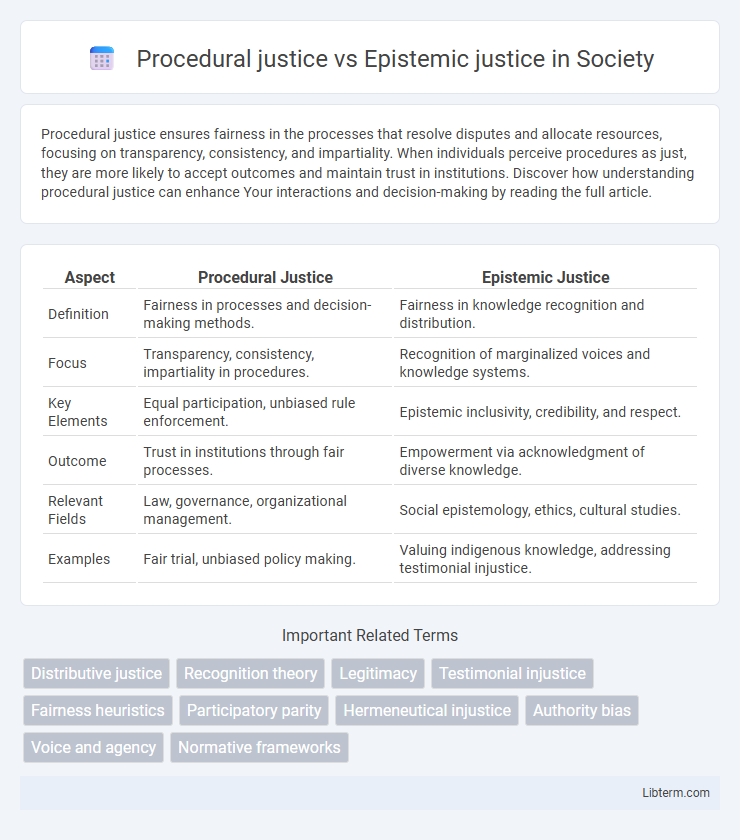Procedural justice ensures fairness in the processes that resolve disputes and allocate resources, focusing on transparency, consistency, and impartiality. When individuals perceive procedures as just, they are more likely to accept outcomes and maintain trust in institutions. Discover how understanding procedural justice can enhance Your interactions and decision-making by reading the full article.
Table of Comparison
| Aspect | Procedural Justice | Epistemic Justice |
|---|---|---|
| Definition | Fairness in processes and decision-making methods. | Fairness in knowledge recognition and distribution. |
| Focus | Transparency, consistency, impartiality in procedures. | Recognition of marginalized voices and knowledge systems. |
| Key Elements | Equal participation, unbiased rule enforcement. | Epistemic inclusivity, credibility, and respect. |
| Outcome | Trust in institutions through fair processes. | Empowerment via acknowledgment of diverse knowledge. |
| Relevant Fields | Law, governance, organizational management. | Social epistemology, ethics, cultural studies. |
| Examples | Fair trial, unbiased policy making. | Valuing indigenous knowledge, addressing testimonial injustice. |
Introduction to Procedural and Epistemic Justice
Procedural justice emphasizes fairness in the processes and decision-making methods, ensuring that all parties have a voice and impartial treatment. Epistemic justice centers on recognizing and valuing individuals' knowledge and experiences, addressing biases that undermine their credibility or understanding. Both concepts are crucial for fostering equitable outcomes and trust in social and legal systems.
Defining Procedural Justice
Procedural justice refers to the fairness and transparency of the processes used to make decisions, ensuring that all parties have a voice and that procedures are consistent, unbiased, and based on accurate information. It emphasizes the importance of impartiality and inclusiveness in decision-making frameworks, often within legal, organizational, or social contexts. While procedural justice focuses on the fairness of the methods, epistemic justice concentrates on recognizing and valuing diverse knowledge and experiences in these processes.
Defining Epistemic Justice
Epistemic justice centers on fairness in the distribution and recognition of knowledge, addressing how individuals or groups are acknowledged as credible knowers within social interactions and institutions. It involves two key components: testimonial justice, which ensures that a speaker's knowledge is respected without prejudice, and hermeneutical justice, which refers to the equitable access to shared interpretative resources necessary for understanding and communication. Unlike procedural justice, which focuses on fairness in processes and decision-making, epistemic justice emphasizes the justice involved in epistemic practices and the validation of knowledge claims.
Historical Contexts of Both Concepts
Procedural justice, rooted in legal and organizational frameworks, emerged prominently during the 20th century to emphasize fairness in processes and decision-making, particularly shaped by developments in democratic governance and human rights law. Epistemic justice, a concept gaining traction in the late 20th and early 21st centuries, addresses injustices in knowledge production and recognition, tracing its origins to feminist philosophy and critical race theory that highlight marginalized voices historically excluded from epistemic authority. Both frameworks critically engage with power dynamics, but procedural justice focuses on equitable procedures, while epistemic justice revolves around equitable epistemic recognition and inclusion.
Key Differences Between Procedural and Epistemic Justice
Procedural justice emphasizes fairness in the processes and procedures used to make decisions, focusing on transparency, impartiality, and consistency to ensure equitable treatment. Epistemic justice centers on the fairness in knowledge production and distribution, addressing issues like testimonial injustice where individuals are unfairly discredited, and hermeneutical injustice when marginalized groups lack the resources to make sense of their social experiences. The key difference lies in procedural justice's concern with the fairness of decision-making mechanisms versus epistemic justice's focus on the fairness in recognizing and valuing marginalized knowledge and voices.
The Role of Power and Authority
Procedural justice evaluates fairness based on transparent processes where power and authority are exercised within established rules ensuring impartiality and consistency. Epistemic justice addresses fairness in the recognition, distribution, and validation of knowledge, questioning how power dynamics influence whose knowledge is considered credible or marginalized. Power and authority critically shape both, determining access to fair procedures and controlling the legitimacy of knowledge in decision-making contexts.
Impact on Social and Legal Systems
Procedural justice emphasizes fair and transparent processes in social and legal systems, ensuring that individuals have equal opportunities to participate and be heard, which strengthens trust and legitimacy. Epistemic justice addresses the recognition and inclusion of diverse knowledge and perspectives, combating bias and promoting fairness in decision-making processes. Together, these forms of justice enhance the effectiveness and equity of institutions by fostering accountability, reducing discrimination, and supporting more inclusive policies and outcomes.
Intersectionality and Justice Frameworks
Procedural justice emphasizes fairness in the processes and decisions that affect individuals, ensuring transparency and impartiality in institutional practices, while epistemic justice centers on recognizing and valuing diverse knowledge systems and lived experiences, particularly those marginalized by dominant groups. Intersectionality deepens these frameworks by highlighting how overlapping social identities--such as race, gender, class, and disability--compound experiences of injustice, necessitating justice approaches that account for multiple, intersecting forms of discrimination. Justice frameworks integrating procedural and epistemic perspectives promote equitable outcomes by both safeguarding fair decision-making processes and validating marginalized voices within systemic power structures.
Contemporary Debates and Challenges
Contemporary debates on procedural justice vs epistemic justice center on balancing fair decision-making processes with the recognition and inclusion of diverse knowledge systems. Procedural justice emphasizes transparent, consistent, and impartial procedures, while epistemic justice challenges these frameworks to value marginalized voices and avoid knowledge-based biases. Current challenges involve integrating epistemic justice claims into institutional procedures without compromising efficiency or legal standards.
Towards Integrative Approaches to Justice
Procedural justice emphasizes fairness in the processes that resolve disputes and allocate resources, ensuring that all parties have a voice and equitable treatment. Epistemic justice addresses fairness in knowledge production and recognition, highlighting the importance of validating diverse perspectives and experiences. Integrative approaches to justice seek to combine procedural fairness with epistemic inclusivity, promoting decision-making that is both equitable and informed by marginalized or underrepresented knowledge systems.
Procedural justice Infographic

 libterm.com
libterm.com